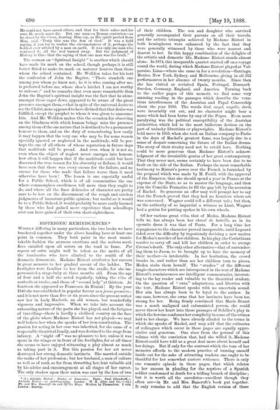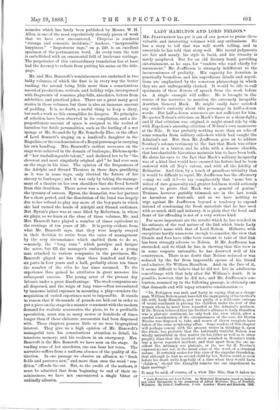HISTRIONIC REMINISCENCES.*
WIDELY differing in many particulars, the two books we have bracketed together under the above heading have at least one point in common. They both paint in the most unmis- takable fashion the arduous exertions and the serious sacri- fices entailed upon all actors on the road to fame. Per aspera ad astra might well be taken as the motto of all the luminaries who have climbed to the zenith of the dramatic firmament. Madame Ristori attributes her success in great measure to her gradual ascent of the ladder. The footlights were familiar to her from the cradle, for she im- personated a stage-baby at three months old. From the age of four and a half she acted regularly, taking the Ales of soubrette at twelve, and those of "second lady" at thirteen. At fourteen she appeared as Francesca da Rimini ! By the year 1840 she was established in popular favour as a jeune premiere; and it is not more than five or six years since the present writer saw her in Lady Macbeth, an old woman, but wonderfully vigorous and impressive. When we take into account the exhausting nature of the parts she has played, and the fatigues of travelling—there is hardly a civilised country on the face of the globe where Madame Ristori has not played—we may well believe her when she speaks of her iron constitution. The passion for acting in her case was inherited, for she came of a respectable theatrical family, and was destined to the stage from infancy. A "night off" was no pleasure to her, unless it was spent in the wings or in front of the footlights, for at all times she seems to have enjoyed witnessing a play almost as much as taking part in it. But this passion for her art never destroyed her strong domestic instincts. She married outside the ranks of her profession ; but her husband, a man of culture as well as of rank, so far from thwarting her, lent valuable aid by his advice and encouragement at all stages of her career. 'The only shadow upon their union was cast by the loss of two • (13 Adelaide Ristori : Etudes et Souvenirs. Paris : Paul 011endorff.— Adelaide Ristori an Autobiography. London W. H. Allen and Co.—(2.) Dir. and Mrs. Bancroft On and Off the Stage. Written by Themselves. 2 vols. London: Bentley. of their children. The son and daughter who survived generally accompanied their parents on all their travels, and the artistic triumphs achieved by Madame Ristori in both hemispheres were enhanced by the fact that they were generally witnessed by those who were nearest and dearest to her. In this happy combination of the delights of the artistic and domestic life, Madame Ristori stands almost alone. In 1874, this inseparable quartet started off on a voyage round the world, during which Madame Ristori played at Val- paraiso, Lima—where she came in for a revolution—Santiago, Mexico, New York, Sydney, and Melbourne, giving in all 312 performances in her absence of twenty months. Since then she has visited or revisited Spain, Portugal, Denmark Sweden, Germany, England, and America. Turning back to the earlier pages of this memoir, we find some very amusing reading in the passages which describe the vexa- tious interferences of the Austrian and Papal Censorship about the year 1850. The words God, angel, angelic, devil, were invariably cut out, and no character might bear a name which had been borne by any of the Popes. Even more paralysing was the political susceptibility of the Austrian authorities, which led to the most ludicrous devices on the part of unlucky librettists or playwrights. Madame Ristori's bold move in 1855, when she took an Italian company to Paris, in the days of Rachel's greatest fame, was largely due to a sense of despair concerning the future of the Italian drama. The story of their rivalry need not be retold here. Nothing could be more generous than Madame Ristori's acknow- ledgment of the irresistible genius of her great contemporary. That they never met, seems certsinly to have been due to no fault on the side of the Italian. Perhaps the most remarkable testimony to Ristori's power over the French is furnished by the proposal which was made by M. Fould, with the approval of the Emperor, that she should spend a year in France at the expense of the State, so as to master the language, and then join the Comedic Franeaise, to fill the gap left by the secession of Rachel. So generous an offer may well prompt her to say that the French proved that they had no frontiers where art was concerned. Wagner could tell a different tale; but then, on the authority of so impartial a witness as Liszt, Wagner had a genius for putting spokes in his own wheels.
Of her various great roles, that of Medea, Madame Ristori tells us, has always been her cheval de bataille, as in its operatic dress it was that of Pasta. For a long time her repugnance to the character proved insuperable, until Legouve tided over the difficulty by ingeniously devising a new motive for Medea's murder of her children. In his play, the Corinthians resolve to carry off and kill her children in order to avenge Creusa's death. The only other alternative—that of surrender- ing them to Jason, to be brought up to hate the memory of their mother—is intolerable. In her hesitation, the crowd breaks in, and rather than see her children torn to pieces, Medea stabs them herself. The " studies " of the different tragic characters which are interspersed in the text of Madame Ristori's reminiscences are intelligent commentaries, interest- ing to the lay reader and valuable to the theatrical student. On the question of "cuts," adaptations, and liberties with the text, Madame Ristori speaks with no uncertain sound. Her aim has always been to be loyal to the author. In one case, however, she owns that her instincts have been too strong for her. Being firmly convinced that Marie Stuart was a much maligned and calumniated person, she could never throw her heart into those passages of Schiller's play in which the heroine confesses her complicity in some of the crimes laid to her charge. We have already alluded to the terms in which she speaks of Rachel, and may add that the estimates of colleagues which occur in these pages are equally appre- ciative and generous. One rises from the perusal of this volume with the conviction that, had she willed it, Madame Ristori could have told us a great deal more about herself and her doings. But if only for the contrast which the tone of her memoirs affords to the modern practice of turning oneself inside out for the sake of attracting readers, one ought to be thankful for her somewhat austere reticence. There is only one romantic episode in these pages, that which relates to her success in pleading for the reprieve of a Spanish soldier condemned to death for a triffing breach of discipline ; but it is worth all the anecdotes—excellent though they often are—in Mr. and Mrs. Bancroft's book put together. It only remains to add that the English version of these memoirs which has lately been published by Messrs. W. H. Allen, is one of the most superlatively slovenly pieces of work that we have ever encountered. Chagrins is rendered "strange and romantic incidents ;" bonheur, "inexpressible happiness." " Impestuous rage," on p. 249, is an excellent specimen of the portmanteau word. At every turn the text is embellished with an ornamental frill of irrelevant verbiage. The perpetrator of this extraordinary translation has at least had the decency to refrain from putting his name on the title- page.
Mr. and Mrs. Bancroft's reminiscences are enshrined in two bulky volumes, of which the first is in every way the better reading, the second being little more than a conscientious record of productions, revivals, and holiday trips, interspersed with fragments of romance, play-bills, anecdotes, letters from oelebrities, and practical jokes. There are a great many good stories in these volumes, but there is also an immense amount of padding. It is, no doubt, a useful thing to keep a diary, but such a work as this exemplifies its dangers. No principles of selection have been observed in its compilation, and a dis- proportionate amount of space is assigned to the recital of harmless but futile personalities, such as the hurling of a wet sponge at Mr. So-and-So by Mr. Somebody-Else, or the effect of Lord Bennett's singing on a landlord's daughter in the Engadine, or the condescension of a Royal personage in carrying his own handbag. Mrs. Bancroft's earliest successes on the stage were achieved in the domain of burlesque; Dickens spoke of "her unchallengeable talent," and declared her to be "the cleverest and most singularly original girl" he had ever seen on the stage in his time. The opinion of the frequenters of the Adelphi and Strand Theatres in those days, gratifying as it was in some ways, only rivetted the fetters of her slavery to burlesque ; and it was only by taking the manage- ment of a theatre on her own shoulders that she freed herself from this thraldom. There never was a more curious case of the tyranny of success. Byron, the dramatist, was her partner for a short period, and the dissolution of the bond was largely due to her refusal to play any more of the boy-parts in which she had turned the heads of Adelphi and Strand audiences. But Byron's place was at once filled by Robertson, in whose six plays, as we learn at the close of these volumes, Mr. and Mrs. Bancroft have played a number of times equivalent to the evenings of ten years of life. It is pretty evident, from what Mr. Bancroft says, that they were largely swayed in their decision to retire from the cares of management by the very circumstance which enabled them to do so, —namely, the "long runs" which paralyse and fatigue the actor, but fill the manager's exchequer. As a young man attached to various companies in the provinces, Mr. Bancroft played no less than three hundred and forty- aix parts in four years and a half, probably about ten times the number of the rides he has since assumed. To the experience thus gained he attributes in great measure his subsequent success. The young actor of the present day labours under a great disadvantage. The stock companies are all dispersed, and the reign of long runs—often necessitated by immense initial expenses in mounting a play—renders the acquisition of varied experience next to impossible. It stands to reason that if thousands of pounds are laid out in order to put a piece on the stage in a manner consonant with the modern demand for realistic accessories, the piece, to be a profitable speculation, must rim so many scores or hundreds of times longer than if these elaborate accessories had been dispensed with. These chapters possess little or no true biographical interest. They give us a high opinion of Mr. Bancroft's managerial tact, his conscientious attention to detail, his tenacious memory, and his coolness in an emergency. Mrs. Bancroft is the Mrs. Bancroft we have seen on the stage. In reading some of her anecdotes, one can hear her voice. The narrative suffers from a uniform absence of the quality of dis- tinction. In one passage we observe an allusion to "fresh fields and pastures new," and more than once the word "ren- dition" offends the ear. But, to the credit of the authors, it must be admitted that from beginning to end of their re- miniscences, we have not encountered a single bitter or unkindly allusion.



































 Previous page
Previous page